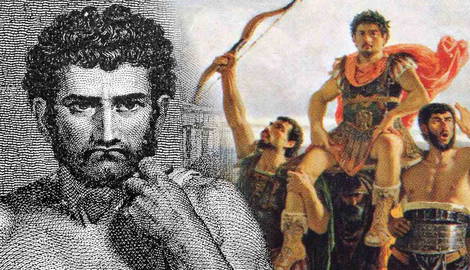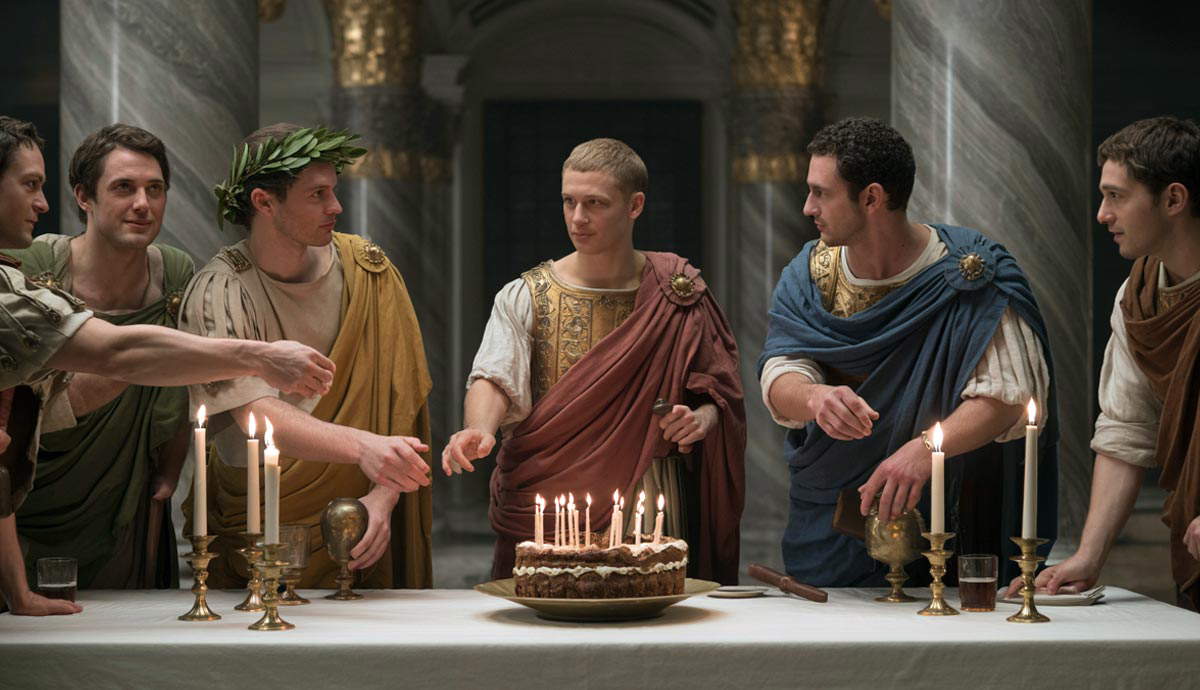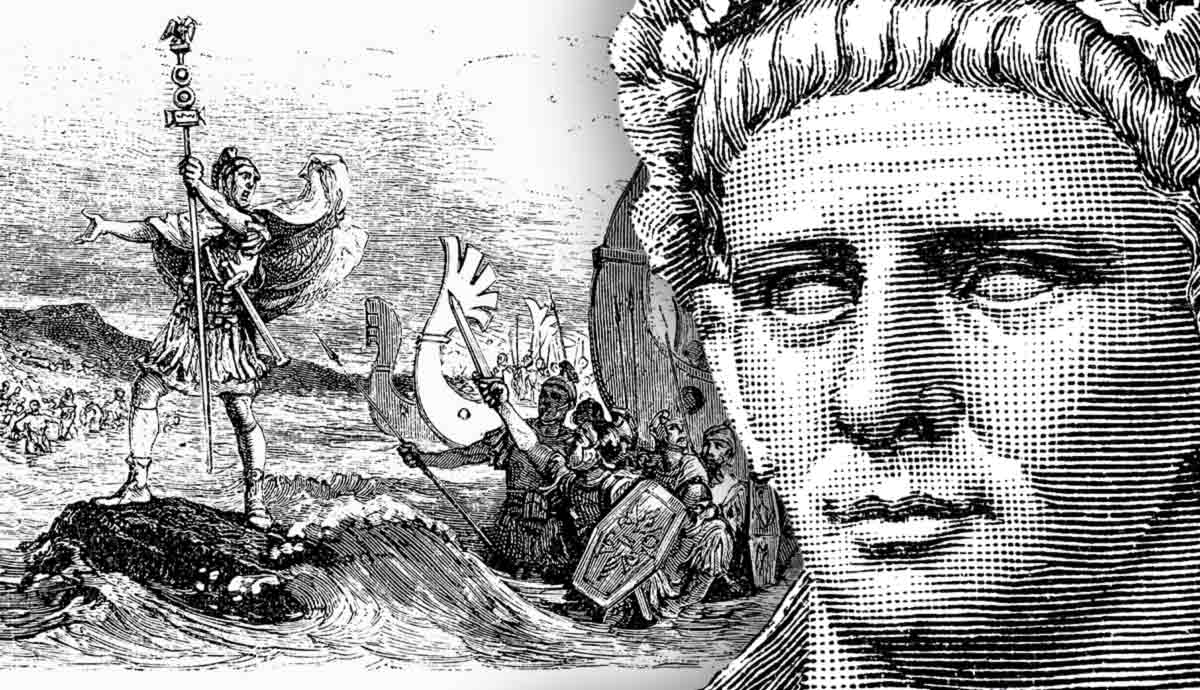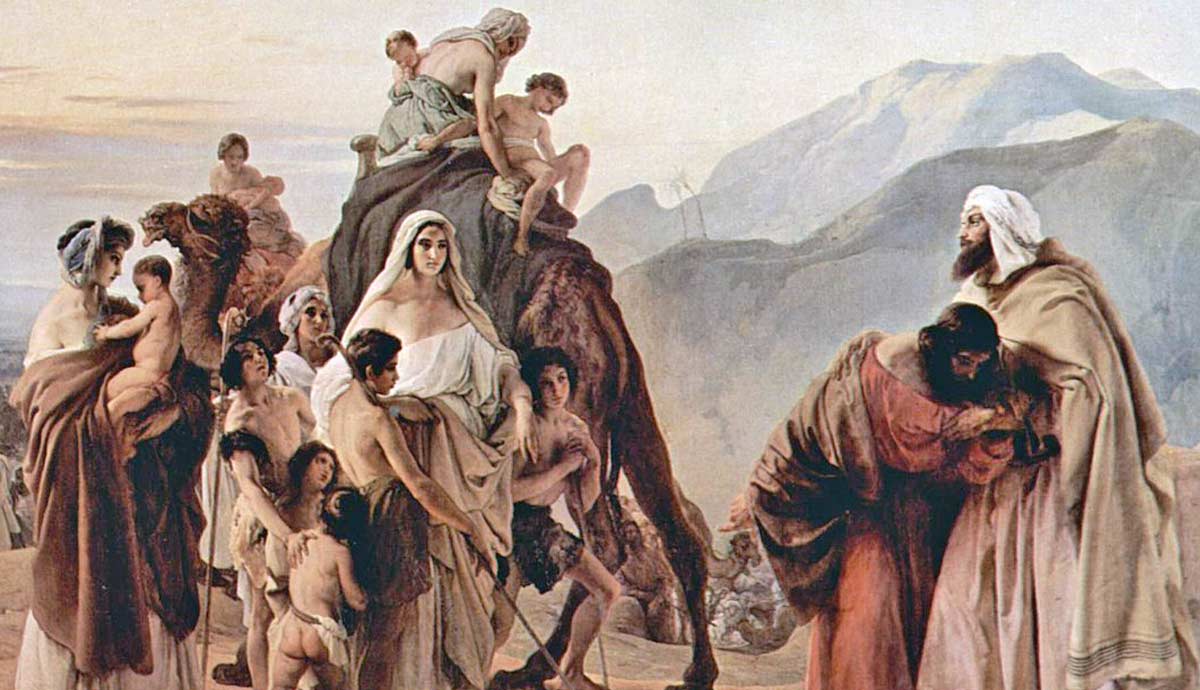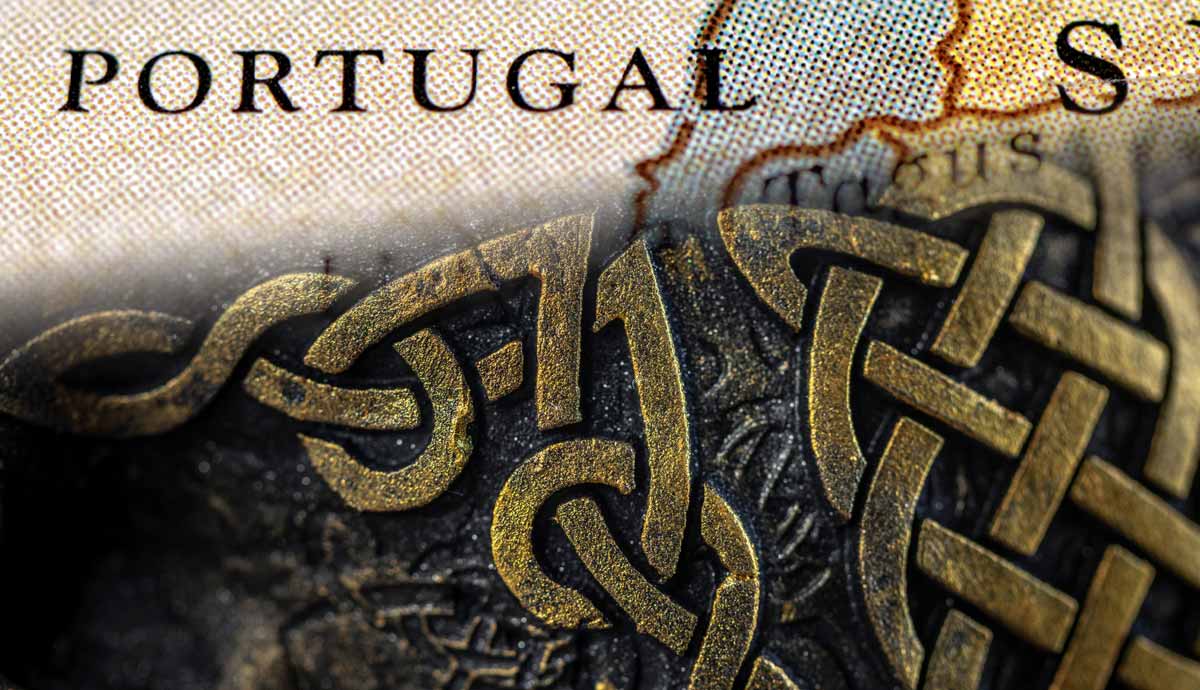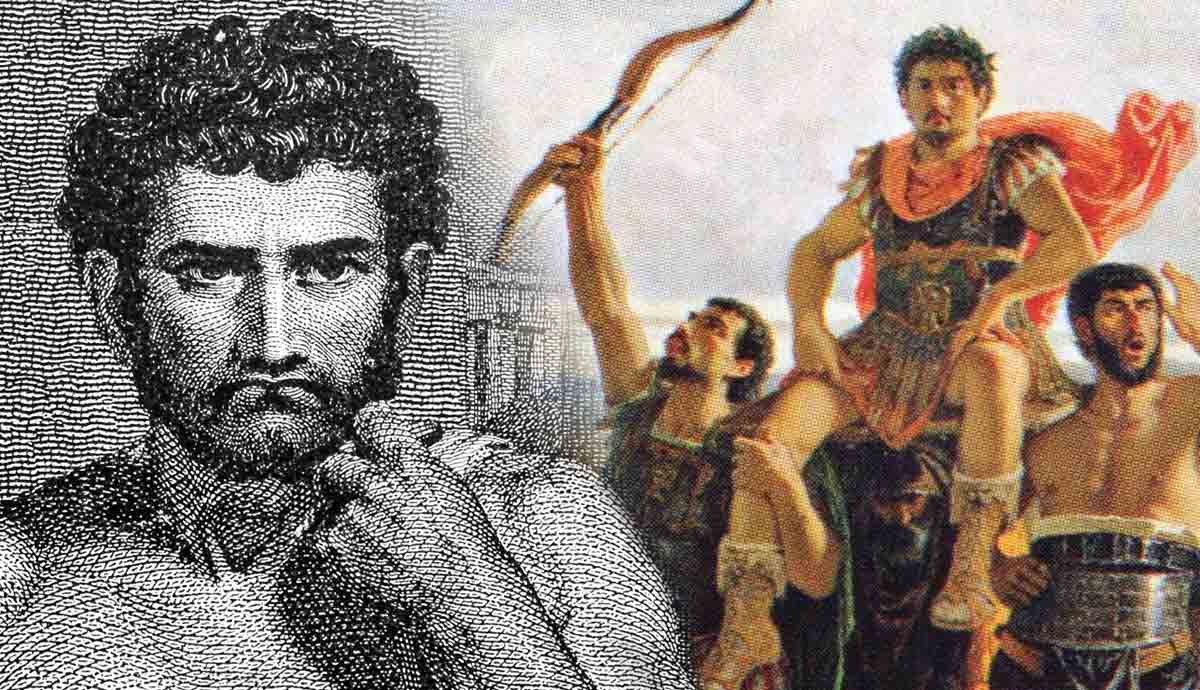
Gaius Marius is one of the most compelling personalities of the Roman Republic. Entering politics as a “novus homo” from Italy with few political connections, he proved both his military skill and unbridled ambition during the Jugurthine War. He was subsequently elected consul an incredible seven times as he was seen as the only general capable of dealing with the Cimbrian threat.
Serving into his late 50s, Marius initially looked like he would retire as a respected statesman, but fate and ambition involved him in a civil war that left the general dead and Sulla as dictator in Rome. This is the story of Rome’s first strongman, who broke precedents and created a personal army, paving the way for future strongmen, like his nephew Julius Caesar.
Gaius Marius: Novus Homo

Gaius Marius was born in 157 BCE in the Arpinum area of Latinum in Italy. Rome conquered the region in the 4th century BCE, but its people were only granted Roman citizenship in 188 BCE. Marius was one of the first leading men of Arpinium to consider a political career in Rome.
The biographer Plutarch suggests Marius came from a family of small landholders and that his father was a laborer. This plays into Plutarch’s characterization of Marius as a commoner who built his formidable career with nothing but ambition. However, Marius must have come from local nobility with considerable wealth for his family to have sponsored his political career, and that of his younger brother Marcus Marius, in Rome.
Nevertheless, when Marius began to climb Rome’s political ladder, he was a “novus homo,” which means that he was the first man in his family to do so. Successful new men were rare. Most Roman politicians could point to fathers, grandfathers, or great-grandfathers who held the consulship and commanded armies. In fact, we will meet many ancestors of the late Republic’s great politicians in Marius’s story. Therefore, despite his wealth, Marius was waging an uphill battle to build his career.
Early Military Experience (134-121 BCE, Age 23-36)

In 134 BCE, Marius had already started his military career and joined the personal legion of the famous general Scipio Aemilianus in Numantia. According to Plutarch, Marius’s military acumen was already evident, and Scipio praised his potential.
This type of support allowed Marius, a political unknown, to be elected military tribune, placing him on the first rung of Rome’s cursus honorum. Later he served under Quintus Caecilius Metellus Balearicus, participating in the conflict that earned Balearicus his cognomen and a triumph in 121 BCE.
Tribune of the Plebs (119 BCE, Age 38)

After serving under Belearicus, Marius reportedly ran unsuccessfully for local office back in Arpinum and for quaestor in Rome. With these routes blocked Marius stood for tribune of the plebs, an office that represented the lower classes and was a vehicle for popular support. He campaigned alongside the consular candidate Lucius Caecilius Metellus Dalmaticus. These kinds of parallel campaigns were common and suggest that Marius was now a client of the powerful Metelli family.
Winning the election, he held office in 119 BCE, passing the Lex Maria, which narrowed the passage that voters passed down to cast their ballots, preventing wealthy patrons from inspecting client ballots.
Higher Political Office (117-110 BCE, Age 40-47)

In 117 BCE, Marius failed to be elected aedile, perhaps because his voting reforms alienated his Metelli supporters. He was narrowly elected praetor in 116 BCE, suggesting that he was still considered relatively unknown and an outsider in Roman politics.
After serving as praetor, he was sent to Further Spain as governor in 114 BCE. He held this coveted position for two years, dealing with brigands and enlarging his wealth through the province’s mineral resources, as was common practice for governors.
In 110 BCE, Marius married Julia, Julius Caesar’s aunt, connecting himself to the prestigious Julii family. This was an advantageous marriage on both sides. It boosted Marius’s aristocratic connections, while the Julii had not had a consul in the family since 157 BCE; they needed some new blood.
Jugurthine War & First Consulship (109-104 BCE, Age 48-53)

In 112 BCE, the Numidian King Jugurtha waged civil war against his half-brothers, during which he massacred Italian traders living in North Africa. This brought him into conflict with Rome, whose first legions to enter the foray suffered a humiliating defeat that needed to be avenged. We know much about the subsequent Jugurthine War from the account of Sallust, a Roman author living about 50 years after the fact.
Marius joined the conflict in 109 BCE as a senior legate of the consul Quintus Caecilius Metellus. He played a pivotal role in several battles. Notably, at the Battle of Muthul, the Numidian light cavalry took the Romans by surprise and broke their infantry into small detachments that could be picked off easily. The Romans were set to be massacred, but Marius was able to form a column of 2,000 men, march through the Numidians, join up with Metellus, and force Jugurtha to withdraw.
Winning Support (109-108 BCE, Age 48-49)

Marius’s military reputation, along with actions such as eating meals alongside the troops and sharing in their labors, won him significant support among the soldiers. He also won support among Italian traders in the area by suggesting he could end the war in a few days with half of Metellus’s troops. Both groups wrote home recommending Marius.
With his growing support, Marius wanted to run for consul in 108 BCE, but Metellus did not support him or give him leave to return to Rome to contest the election. Nevertheless, Marius was determined, according to Sallust, partly due to a positive prediction from a fortune-teller; the Romans placed great stock in the predictions of soothsayers and astrologers.
Also in 108 BCE, a Roman detachment garrisoned at Vege was ambushed and annihilated, but their commander, who was a client of the Metelli, survived. Probably looking to boost his popularity, Marius urged Metellus to sentence him to death for cowardice, but Metellus refused. Marius sent letters to Rome denouncing Metellus’s actions, and the general finally let Marius return to Rome to run for consul, no doubt wanting the troublemaker out of his camp.
Consulship & Command (107-106 BCE, Age 50-51)

In Rome, Marius used widespread dissatisfaction with how the war was being managed to be elected one of the two consuls for 107 BCE. He did not immediately get the Numidian command because the Senate had extended Metellus’s command. Not one to be disappointed, he had a friendly tribune of the plebs override the senatorial order and have the plebiscite grant him command. An angry Metellus returned to Rome where he was voted a triumph and the name Numidicus.
Marius understood that he would need fresh troops to end the war in Numidia quickly. Rome’s traditional recruits, landowning citizens, were overextended, so Marius obtained permission to recruit discharged veterans and men without property to fight in exchange for loot. Some modern scholars suggest that this led to a change in Roman military recruitment, but the evidence suggests this happened a few decades later. Nevertheless, Marius’s innovation set a precedent. He left for Africa with new cavalry, and his new infantry sailed behind him with his quaestor Lucius Cornelius Sulla.

Despite his new recruits, Marius did not manage to defeat Jugurtha in a few weeks. The Numidians effectively used guerilla tactics to rob the Romans of an overall victory. Marius arrived late in 107 BCE and successfully engaged the Numidians near Cirta. He then launched a dangerous march through the desert to capture the city of Caspa in a surprise attack. Even though the town surrendered, Marius sent a message by killing all the men, enslaving the survivors, and allowing his men to loot the city.
This put such sufficient pressure on Jugurtha that he went to his father-in-law Bocchus, the king of Mauretania. While Bocchus seems to have been reluctant to engage the Romans, when Marius captured a fortress near the river Molochath in the west in 106 BCE, he began to encroach on Bocchus’s territory. A combined force of Numidian and Mauretanian troops surprised Marius in the desert near Serif. They managed to hold off the enemy until nightfall when the Africans retired. Then at dawn, the Romans surprised the Africans by attacking their camp and completely routed their army. Nevertheless, they still did not have Jugurtha or victory.
The Defeat of Jugurtha (105-104 BCE, Age 52-53)

Despite Marius never suffering a military defeat, it became clear that the Romans would never fully deal with Jugurtha by military means. Instead, they negotiated with Bocchus to hand over Jugurtha in exchange for part of his territory and a Roman alliance. Sulla, who had friends at Bocchus’s court, was sent to receive Jugurtha and oversee the slaughter of his surviving followers.
When Marius returned to Rome, Jugurtha was paraded in his triumph in 104 BCE, and then thrown into Rome’s underground prison. After the triumph, there was talk of who deserved credit for the victory, Marius or Sulla. The war was won under Marius’s auspices, so he celebrated the triumph, but clearly, Sulla was leveraging his role to rally support for his political ambitions.
The Cimbrian War (104-101 BCE, Age 53-56)

While Marius was now a celebrated general, Rome’s other generals were having less success. In 109 BCE, a Germanic tribe called the Cimbri moved into Gaul and battered the Romans. This dramatically reduced Rome’s prestige among the recently subdued Celtic tribes of Gaul, who began to agitate. In 107 BCE, Marius’s consular colleague Longinus suffered a terrible defeat at the hands of the Tigurini Celts.
In 106 BCE, the new consul Quintus Servilius Caepio arrived with a new army, and he was joined in 105 BCE by yet another new consul, Gneaus Mallius Maximus. The two men were antagonistic towards one another and were unable to cooperate. Consequently, the Germans could divide and conquer. The Cimbri and Teutones trapped Mallius and his men in their camp on the Rhone. They then used overwhelming numbers to defeat Caepio at the Battle of Arausio. The survivors fled to Mallius’s camp, where the Romans were pinned down and annihilated.
News of this humiliating defeat reached Rome around the same time as news of Marius’s success against Jugurtha. Seeing Marius as their only hope, the Senate took the unprecedented step of electing Marius as consul for 104 BCE in absentia; traditionally candidates had to be in Rome to be elected consul. After his triumph, Marius headed to Gaul to deal with the Cimbri, who were now in Spain.
War Preparations (104-103 BCE, Age 53-54)

When Marius took up the command, again with Sulla as his legate, the legions in Gaul had been decimated. Again, he recruited veterans and unlanded Romans to fight, gathering 30,000 Roman and 40,000 Italian and allied troops. He was in no rush to engage, instead establishing a base at Aquae Sextiae to train his new men.
The Cimbri were a big enough threat that Rome was willing to give Marius time, and he was re-elected as consul, again in absentia, in 103 BCE, even though he could have continued his command as proconsul. But in 103 BCE, Marius was still forced to return to Rome to oversee consular elections for the following year because his colleague had died in office. Despite not yet making any progress against the Cimbri, he was re-elected yet again in 102 BCE.
Defending Italy (102-101 BCE, Age 55-56)

In 102 BCE, with Marius back in Gaul, the Cimbri finally emerged from Spain with plans to move into Italy with their allies. The Teutones and the Ambrones were to advance into Italy from the south, while the Cimbri and Tiburini planned separate crossings over the Alps. The consuls Marius and Quintus Lutatius Catulus split their troops, with Marius in Gaul and Catulus defending the Alps.
Marius initially refused to engage the Teutones and Ambrones in battle, instead staying in his fortified camp. When the tribes passed him to move toward Italy, he was able to shadow them and wait for the best moment to attack. This came near Aquae Sextia when the Ambrones attacked Roman soldiers collecting water. The Romans slaughtered 30,000 Germans. The following day, the Ambrones and Teutones attacked the Romans again, who had an advantageous position on a hill. The Germans were outflanked and Marius’s men killed at least 100,000 of them. Marius’s subordinate and ally Manius Aquilius was sent to Rome to report on the engagement, where he was elected consul along with Marius, again in absentia, for 101 BCE.

Catulus was not as successful as Marius and the Cimbri made it across the Alps into northern Italy. When Marius received the news that he had been re-elected consul he returned to Rome. He delayed celebrating another triumph to join up with Catulus. He met the Cimbri at the Battle of Vercellae and had a decisive victory, which again involved actions by Sulla, who was leading the cavalry. Around 120,000 Cimbri were reportedly slaughtered or enslaved. When the Tigurini heard the news, they abandoned their advance and returned to Gaul.
Later that year there were 15 days of thanksgiving and a shared triumph for Marius and Catulus, though according to Plutarch, everyone knew the victory belonged to Marius. Basking in his glory, Marius secured yet another consulship for 100 BCE alongside Lucius Valerius Flaccus.
Twilight Years (100-87 BCE, Age 57-70)

Marius needed his sixth consulship to ensure credit for his victories in the Cimbrian War and to get the land he had promised his veterans. He worked together with a tribune of the plebs called Lucius Apuleius Saturninus to push through what he needed. But Saturninus proved ruthless, even assassinating a political opponent, so Marius soon distanced himself from the tribune.
Later in his term, Marius used his power as the standing consul to block Saturninus’s ally Glauca from standing for consul. Again, Saturninus killed one of the standing candidates to delay the election and give Glauca another chance. The conflict in the city got so bad that the Senate passed their first ever senatus consultum ultimum that ordered the magistrates, so Marius, to take whatever action necessary to end the unrest caused by another magistrate, Saturninus. Marius rallied volunteers from his veterans and the people and used them to besiege Saturninus on the Capitoline, where he was killed by an angry mob. Glauca was also dragged from his house and killed.
Despite being authorized by the Senate, this incident left its mark on Marius’s reputation, and his career suffered. He traveled to Galatia in 98 BCE to fulfill a vow he had made to Magna Mater, and probably to flee the embarrassment of having to abandon his candidature for the position of censor due to a lack of support. Nevertheless, he clearly still had friends in Rome, as in the same year he was elected in absentia to the College of Augurs. There are also records of him being present at the trial of his friend Manius Aquilius in 98 BCE, which was enough to see him acquitted, and defending Titus Matrinius in 95 BCE.

Marius was back in action briefly during the Social War. This conflict with Rome’s Italian allies, socii, started in 95 BCE when the Lex Licinia Mucia expelled all residents from Rome who were not Roman citizens. Then, in 91 BCE, Marcus Livius Drusus, a tribune of the plebs, proposed land reforms and citizenship for the Italian allies. When Drusus was assassinated, the Social War broke about between Rome and the Italian allies.
Marius acted as a senior legate for the consul Publius Rutilius Lupus, but when he fell during an ambush on June 11, 90 BCE, Marius took command and was able to drive back the enemy forces. The Senate then appointed Marius to take over the command, and he won another important victory, again with the help of Sulla. But the following year he was replaced with no fanfare by the new consul Lucius Porcius Cato. It is possible that he relinquished the command willingly due to his age. The war was concluded in 87 BCE without further input from Marius.
Civil War & Death (88-86 BCE, Age 69-71)

A new conflict broke out in 88 BCE when Mithridates of Pontus started invading Rome’s client kingdoms and holdings in Asia. This led to fierce competition for the consulship in 88 BCE for the honor of leading Rome’s armies against the eastern king. Sulla was elected consul and received the command.
The following year, the now 70-year-old Marius started to position himself for his 7th consulship, seemingly with his eye on the command against Mithridates. To gain support he worked with Sulpicius Rufus, a candidate for tribune of the plebs, to distribute new Italian citizens into 35 voting tribes. This led to riots, delaying Sulla’s departure, as the consul worked to restore peace, but a deal was struck between Marius, Rufus, and Sulla. When the riots were quelled and Sulla left, Rufus passed his bill, but with an amendment that gave Marius command against Mithridates.

Marius sent two of his legates to take over the command from Sulla, who refused and killed the legates. In an unexpected move, Sulla then turned and marched on Rome, forcing Marius to try to defend the city with gladiators. Marius was defeated and fled to his veterans in Africa. Back in Rome, Sulla proscribed the people who had worked against him and had a death sentence passed on Marius and his allies. He then reconfirmed his command and continued his march towards Mithridates.
With Sulla away, unrest broke out in Rome again when the conservative Gnaeus Octavius and the populist Lucius Cornelius Cinna were elected consuls with opposing agendas. Marius used the opportunity to gather ten legions and march on Rome. Like Sulla before him, he purged his opponents including the well-known senators Lucius Licinius Crassus, Marcus Antonius Orator, and Lucius Julius Caesar.
Show elections were held and Marius was made consul for 86 BCE with Cinna. Sulla was again declared an enemy and stripped of his command. But before Marius could do anything to take up the command against Mithridates himself, he died, apparently of natural causes on January 13, 86 BCE.
The civil war continued without Marius, who was made the scapegoat for many crimes. The conflict culminated with Sulla returning to Rome and having himself declared dictator.
